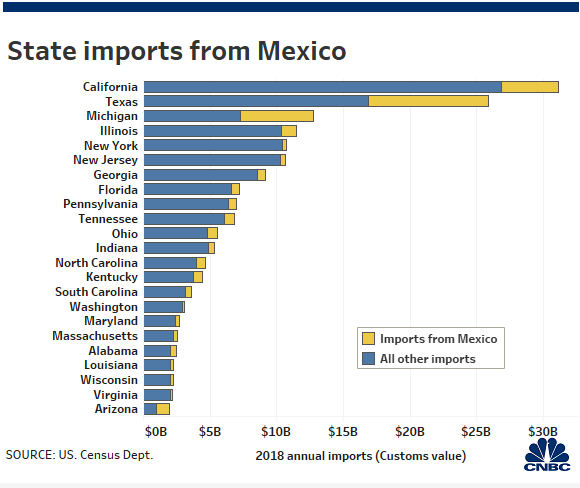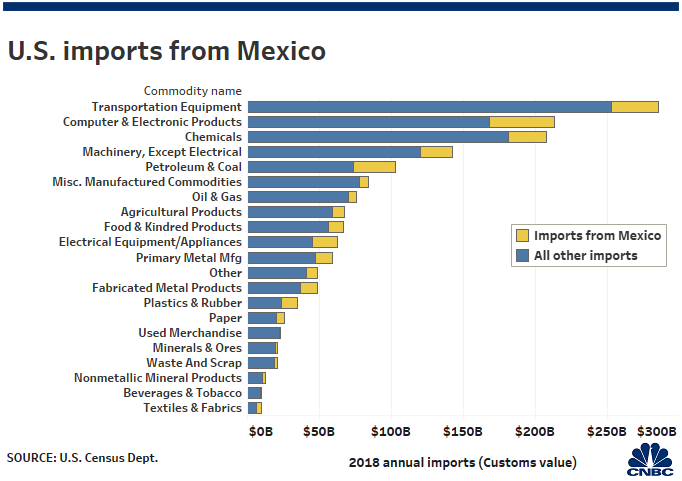Here are the states where Trump's Mexico tariffs would hit the hardest - 4 minutes read
Fiat Chrysler Automobiles assembly workers build 2019 Ram pickup trucks at the FCA Sterling Heights Assembly Plant in Sterling Heights, Michigan, October 22, 2018.
Rebecca Cook | Reuters
A handful of U.S. states — including some that will play big roles in the 2020 election — will feel the brunt of the pain from President Donald Trump's new tariffs on imports from Mexico.
On Thursday night, the president said the U.S. would put 5% duties on all Mexican imports on June 10 to push its southern neighbor to curb illegal immigration. The tariffs will gradually increase to 25% in October, the White House said.
If Trump goes through with the duties, their effects will ripple across the country. America imported $346.5 billion in goods from Mexico last year, 10% more than in the prior year, according to the Office of the U.S. Trade Representative. But several key 2020 electoral states would take a particularly sharp blow from the tariffs.
Border state Arizona gets about 40% of its imports from Mexico, the highest share for any state. About 38% of Michigan's imported products come from Mexico, while about 35% of Texas' imports are from its southern neighbor.
Trump's surprise tariffs on Mexican goods could raise costs for companies and consumers in those three states, which the president carried in the 2016 election.
Michigan is a swing state that had voted for Barack Obama in 2008 and 2012. Texas is a reliably red state, but nonetheless has several Republican lawmakers facing tough reelection campaigns next year. Arizona has been trending toward favoring Democrats.

The duties could have broader effects. They raise questions about whether the U.S. and Mexico can ratify updates to the North American Free Trade Agreement, a top Trump priority. Only Thursday afternoon, the Trump administration took a formal step to speed up congressional approval of the deal, dubbed the United States Mexico Canada Agreement, or USMCA.
The Republican senators from Iowa — an electoral swing state reliant on agricultural exports to Mexico and Canada — warned of dire consequences from the tariffs. Senate Finance Committee Chairman Chuck Grassley called Trump's plan a "misuse of presidential tariff authority" that "would seriously jeopardize passage of USMCA, a central campaign pledge of President Trump's." Sen. Joni Ernst, who is up for reelection next year, also said that "if the president goes through with this, I'm afraid progress to get this trade agreement across the finish line will be stifled."

Sen. Martha McSally, an Arizona Republican who will run to keep her seat in one of next year's most important Senate races, said in a statement that she does not "support these types of tariffs, which will harm our economy and be passed onto Arizona small businesses and families."
The most powerful Republican in Congress, Senate Majority Leader Mitch McConnell, gave a more tepid response. In a statement, the Kentucky lawmaker said "a healthy and vibrant economic relationship with Mexico is a vital source of our joint prosperity."
"Any proposal that impacts this relationship deserves serious examination and I look forward to discussing this plan in greater detail with my colleagues and the administration," he said.
Representatives for Michigan and Texas lawmakers who could face tough reelection bids next year, such as Sen. John Cornyn, R-Texas, Rep. Will Hurd, R-Texas, and Sen. Gary Peters, D-Mich., did not immediately respond to CNBC's requests to comment.
The tariffs would affect a range of products and industries. The top imports from Mexico include transportation equipment, computer and electronic products, and chemicals.
Business interest groups from the National Association of Manufacturers to the National Pork Producers Council criticized the possible duties on Mexican products, raising fears both about the prospects for USMCA ratification and retaliatory tariffs on American exports to Mexico.
Subscribe to CNBC on YouTube.